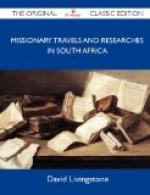Seeing me ill, he benevolently offered me his bed. Never shall I forget the luxurious pleasure I enjoyed in feeling myself again on a good English couch, after six months’ sleeping on the ground. I was soon asleep; and Mr. Gabriel, coming in almost immediately, rejoiced at the soundness of my repose.
Chapter 20.
Continued Sickness—Kindness of the Bishop of Angola and her Majesty’s Officers—Mr. Gabriel’s unwearied Hospitality—Serious Deportment of the Makololo—They visit Ships of War—Politeness of the Officers and Men—The Makololo attend Mass in the Cathedral—Their Remarks—Find Employment in collecting Firewood and unloading Coal—Their superior Judgment respecting Goods—Beneficial Influence of the Bishop of Angola—The City of St. Paul de Loanda—The Harbor—Custom-house—No English Merchants—Sincerity of the Portuguese Government in suppressing the Slave-trade—Convict Soldiers—Presents from Bishop and Merchants for Sekeletu—Outfit—Leave Loanda 20th September, 1854—Accompanied by Mr. Gabriel as far as Icollo i Bengo—Sugar Manufactory—Geology of this part of the Country—Women spinning Cotton—Its Price—Native Weavers—Market-places—Cazengo; its Coffee Plantations—South American Trees—Ruins of Iron Foundry—Native Miners—The Banks of the Lucalla— Cottages with Stages—Tobacco-plants—Town of Massangano—Sugar and Rice—Superior District for Cotton—Portuguese Merchants and foreign Enterprise—Ruins—The Fort and its ancient Guns—Former Importance of Massangano—Fires—The Tribe Kisama—Peculiar Variety of Domestic Fowl—Coffee Plantations—Return to Golungo Alto—Self-complacency of the Makololo—Fever—Jaundice—Insanity.
In the hope that a short enjoyment of Mr. Gabriel’s generous hospitality would restore me to my wonted vigor, I continued under his roof; but my complaint having been caused by long exposure to malarious influences, I became much more reduced than ever, even while enjoying rest. Several Portuguese gentlemen called on me shortly after my arrival; and the Bishop of Angola, the Right Reverend Joaquim Moreira Reis, then the acting governor of the province, sent his secretary to do the same, and likewise to offer the services of the government physician.
Some of her majesty’s cruisers soon came into the port, and, seeing the emaciated condition to which I was reduced, offered to convey me to St. Helena or homeward; but, though I had reached the coast, I had found that, in consequence of the great amount of forest, rivers, and marsh, there was no possibility of a highway for wagons, and I had brought a party of Sekeletu’s people with me, and found the tribes near the Portuguese settlement so very unfriendly, that it would be altogether impossible for my men to return alone. I therefore resolved to decline the tempting offers of my naval friends, and take back my Makololo companions to their chief, with a view of trying to make a path from his country to the east coast by means of the great river Zambesi or Leeambye.




